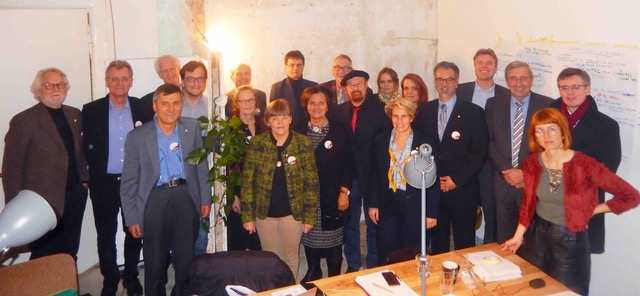In the Final report on Assessment of the feasibility of phasing-out dental amalgam, on page 32, used Berlin Declaration as the reference, more precisely:
*2017: Berlin Declaration: After a gathering at a two-day Pan-European Summit to plan the end of amalgam, environmental and consumer NGOs, dental associations, Members of the national parliaments and the European Parliament, academics, and industry issued the “Berlin Declaration to End Amalgam Use in Europe in 2020, available at: https://www.ig-umwelt-
Environmental Ambassadors for Sustainable Development expert participated in Berlin Declaration development! EASD lead Initiative in Serbia.
In 2020 the European Commission recommends the phase out of amalgam. In concluding that the end of amalgam is “technically and economically feasible,” the Commission explains in its report (mentioned above) to Parliament and Council.
· The alternatives are fully acceptable, and dentists fully trained to put them in, quoting: “Mercury free materials are nowadays of good quality, effective restoration methods are widely available and dental schools are increasingly teaching the necessary skills”.
· The risk from BPA (present in some but not all composite) is “negligible’;
· The price differential has shrunk so much such that neither patients nor dentists, will be adversely affected by the phase out;
· 95% of amalgam manufacturers also make alternatives hence they are fully prepared to switch;
Therefore the European Commission will propose a legislation in 2022 for a phase out on a date specific, earlier than 2030.
The report of the Commission focuses equally on the international challenge to end amalgam by promising to turn its attention in 2021 to (a) an amendment of the Minamata Convention and (b) international trade rules to stop amalgam trade.
____________________________
November 2020: Our letter to Commissioner (the European Commission and Commissioner for the Green Deal) Frans Timmermans was well-received
Letter, sent at October 26, 2020 :
Dear Commissioner Timmermans,
European civil society salutes you for your landmark decision to recommend the phase out of dental amalgam to the Parliament and the Council.
Dank u wel!
Your decision makes sense for five solid, incontrovertible reasons:
1. Environment: Dental amalgam is the single largest use of mercury in Europe – and unnecessarily so. The European Union’s science committee SCHER calls amalgam a “secondary poison” because its mercury methylates in fish that children then eat.
2. Technology: Over the past decade the alternative materials have surpassed amalgam in effectiveness – and unlike amalgam, they are minimally-invasive and tooth-friendly.
3. Economics: The prototype is here, because in 2018 amalgam was banned for children, pregnant women, and breastfeeding women, and simple changes in insurance and government programs made the transition seamlessly. The same can now be done for the general population. Moldova, the poorest nation in Europe, banned all amalgam use last year.
4. Preparedness: (1) Manufacturers are ready: virtually all of them make the alternatives, so no jobs will be lost. (2) Dentists are ready: all know how to place the alternatives to amalgam and probably half of them have stopped using amalgam altogether. (3) Consumers are ready: in the European Commission’s internet poll before the Mercury Regulation was enacted, 88% voted in favor of an amalgam ban. (4) Member States are ready: 89% of the Member States (24 of 27), encompassing fully 88% of the population, either have phased out amalgam, have announced a phase-out date, or have low to moderate amalgam use already.
5. Synergies with other EU goals: Whether the goal is specific, such as clean water, or general, such as the Green New Deal with the Chemicals Strategy for Sustainability , the route to a toxic-free Europe must include the end of dental amalgam, a primitive device that pre-dates the Franco-Prussian War and can lead to cracked teeth.
We wish to single out and thank your team at the Commission who laboriously and competently shepherded this issue to the end point of recommending the demise of amalgam for Europe: Aneta Willems, Christopher Allen, David Grimeaud, and Jenny-Johanna Green.
We wish to continue to work with the Commission as you craft legislation for Parliament and the Council to phase out amalgam, and we urge you to set a phase-out date of 2025 or sooner.
Good health to you.
Florian Schulze, European Center for Environmental Medicine (Europe), IG Umwelt-Zahnmedizin (Deutschland)
Elena Lymberidi-Settimo, European Environmental Bureau (Europe)
Dr. Claudia Castell-Exner, President of EurEau – European Federation of Water Services (Europe)
Génon K. Jensen – Health and Environment Alliance (Europe)
Laurette Casal & Antoine Lecuyer, Non Au Mercure (France)
Hanna Schudy, EKO-UNIA (Polska)
Sascha Gabizon, Women Engage for a Common Future (Nederland)
Trine Jørgensen, Foreningen mod Skadeligt Dentalmateriale (Danmark)
Andjelka Mihajlov, Environmental Ambassadors for Sustainable Development (Србија)
Ann-Marie Lidmark, Tandhälsoförbundet (Sverige)
Dr. Hanns Moshammer, ÄrztInnen für eine gesunde Umwelt (Aegu) (Österreich)
Dr. Elena Manvelyan, Armenian Women for Health and Healthy Environment (Hayastan)
Monika Frielinghaus, SHV für Umweltgeschädigte e.V. (Deutschland)
Dr. Stefan Dietsche, European Academy for Environmental Medicine (Deutschland)
Lutz Höhne, Deutsche Gesellschaft für Umwelt-ZahnMedizin e.V. (Deutschland)
Susana Fonseca, ZERO – Associação Sistema Terrestre Sustentável (Portugal)
Reinhard Lauer, Bundesverband der Beratungsstellen für Umweltgifte, insbesondere Amalgam, Schwermetalle und Holzschutzmittel e.V. (Deutschland)
Julia Tudare, Intoxication Métaux Nouvelle-Calédonie (Nouvelle-Calédonie)
Graeme Munro-Hall, World Alliance for Mercury-Free Dentistry (United Kingdom)
Dr. David Harvie-Austin, British Society for Mercury Free Dentistry (United Kingdom)
Leticia Baselga, Ecologistas en Acción (España)
Branislav Moňok, Friends of the Earth – SPZ (Slovenská republika)
Dr. Mihaela Cuțui, Timiș College of Dentists (România)
Dr. Claudia Bottino, Metallica_mente (Italia)


